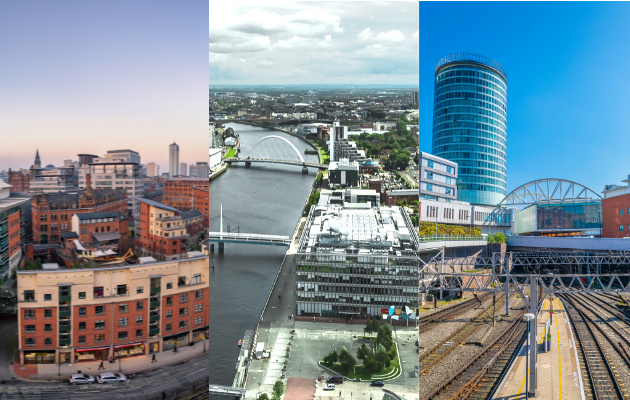
Levelling up the economy should be about helping struggling places, but policy must recognise its limitations in how much it can do for different places.

Here's everything you need to know about the Levelling Up White Paper.
What should levelling up mean?
Government should provide a specific definition of what “levelling up” means; we suggest the following:
Government should tackle the long-running underperformance of Britain’s largest cities and make them more attractive places for private sector investment in order to level up the national economy. This will take decades to materialise. Amongst other things, government should:

Levelling up the economy should be about helping struggling places, but policy must recognise its limitations in how much it can do for different places.

In advance of the Government’s forthcoming Levelling Up White Paper, this briefing sets out what the levelling up agenda should aim to achieve and a strategy for achieving it.
We recommend the following three metrics should be adopted by government:
Government needs to prove to voters that it is delivering what it promised, while ensuring that interventions have a long-lasting impact and reduce inequalities. The levelling up agenda must provide clear economic goals and success measures whilst ensuring good communication between Whitehall departments and layers of government. Cities will need separate levelling up packages to towns and/or rural areas, whilst economic divides within cities (as well as between) must also be addressed. The North will not be levelled up by allowing those in the South to level down.
Levelling up does not mean relocating central government’s capacities outside of the Greater South East, but transferring powers from central to local government. Levelling up also means the creation of tens of thousands of new private sector jobs, rather than the transfer of a few thousand civil service jobs. The latter will only benefit a handful of places, as there are only so many departments which can be moved.

Relocating government departments grabs headlines. But if it wants to make a difference, Whitehall must reorganise and empower local government.

Relocating civil servants will not, on its own, improve Government thinking; here's what will.
Centre for Cities worked in partnership with ITV News and FocalData to poll people across the country on levelling up. 42 per cent of the public said they understood what levelling up meant, although people across the country are less confident that the government will achieve levelling up and most people ranked better job opportunities in their area as a very important priority.
Objective #1: Empowering local leaders and communities
Centre for Cities compiled an anthology of views from urban leaders across the country in advance of the government’s levelling up White Paper. Tracy Brabin, Abi Brown, Andy Burnham, Philip Broadhead, Georgia Gould, Peter Lamb, Graeme Miller and Chris Poulter all contributed.
Government should reorganise and simplify local government around the country to align its shape to that of local economies, with directly elected leaders and accountable institutions. We would advocate for a “New Deal for Local Government” which entails a redrawing of boundaries to 69 mayor-led authorities responsible for economic growth; the reform of all two-tier systems to unitary structures; directly-elected leadership for every local area with four-year terms; and everywhere with the same devolved powers as London.

This report sets out how the Government should use the devolution white paper to reorganise and simplify local government to level up the country.

This report outlines how Mayors provide the Government with the opportunity to develop a new effective set of regional economic development policies to level up across the country and contribute to increasing the UK’s rate of economic growth.
The Chancellor’s Autumn Budget £8.7 billion commitment to devolved administrations is a good start, but many policy levers under the banner of levelling up would be devolved matters, so significant power and resources should be devolved away from Whitehall. On Scotland and Wales, the focus should be on improving the economic performance of Glasgow and Cardiff through addressing skills shortages.

Scotland is largely missing from discussions on levelling up. But levelling up the economy will require policy to pull up Glasgow.

The Chancellor put increased spending on public services at the heart of his levelling up vision, but was quiet on productivity

Reflecting on the results of the elections to the devolved parliaments in Scotland and Wales, Anthony Breach proposes that politicians should take inspiration from the popularity and success of the English metro mayors and embark on a wave of urban devolution.
If housing in expensive cities became cheaper thanks to planning reform and a local increase in new homes, this would boost local disposable incomes, increasing demand for goods produced by firms in the rest of the UK. This would support the North and Midlands’ private sector whilst reducing inequality and improving living standards in the South.
Objective #2: Growing the private sector and boosting living standards, particularly where they’re lower
In the short term, the challenge across the UK is to help those who lost jobs during the pandemic make their way back into the labour market. In the long term, the focus should be on the types of jobs being created, i.e. less economically prosperous places need to attract more knowledge-intensive businesses. This can only happen through investment in skills, improving office / co-working provision in city centres and transport infrastructure, R&D spending and devolution.
The UK’s problem is that most of its big cities make poor use of their inherent advantages, and unlike in Europe / the US, they do not become more productive as they get larger. The issue is not with agglomeration per se, however, Manchester’s and Birmingham’s city centres are high-skilled economies and have gone through rejuvenation in the last 30 years, but they are too small. To achieve their productivity potential, their successful city centre economies should be enlarged.

It is well known that British cities do not get more productive as they get bigger. But a very different picture emerges when looking at city centres with implications for levelling up.

Discussions on R&D spending need to move beyond geographic imbalances in public funding if they are to help policy makers encourage innovation in other parts of the country.
Highly-skilled exporting work in the private sector outside the Greater South East should be increased, and this should focus on large cities where these jobs can flourish whilst bearing in mind that some places will always possess a competitive advantage in low-cost production. Policy should focus on addressing issues which stop high-skilled businesses investing in places with unfulfilled potential, rather than sticking to industries which poorer places have. This includes investments around skills, transport, commercial property and other areas.

This briefing uses the theory of economic complexity to show how the economies of Britain’s cities and large towns have developed over time and sets out the implications for how the Government should approach its levelling up agenda.

Economically struggling places need to look more critically at what they don’t have – not what they do have.
Objective #3: Spreading opportunity and improving public services, particularly where they’re lacking
As part of the levelling up agenda, increasing opportunity and prosperity has been identified as a key aim, and skills are the best indicator for employment outcomes. A more qualified workforce will attract businesses that provide high-skilled job opportunities and boost the economy, levelling up underperforming cities.
Central government should end austerity for local government to improve the day-to-day services that people across the country experience. Fairer funding for local government should focus on reforming the way social care is funded, giving local authorities greater freedom in how they raise funding, setting multiyear budgets, and allowing sales fees and charged raised in one services area to be spent on any service area.
A lack of public transport infrastructure is regularly defined as the main cause of regional inequality in the UK. 67% of people in large European cities can reach their city centre by public transport versus 40% in their UK equivalents, whilst British cities are hampered by their low-rise built form, limiting people’s job opportunities. Government should continue to invest in new infrastructure in the cities where it is needed, whilst the planning system should be reformed to densify big cities to a mid-rise built form.

This report examines whether intra-urban public transport plays a role in the underperformance of big British cities and sets out the implications that transport has for the levelling up agenda.

More than ever before mayors need to be able to control the bus services in their city. This report explains why and sets out how they can achieve this.
Objective #4: Restoring local pride
Successful high streets are an outcome, not a driver, of successful city centre economies. The key to improving cities’ amenities is rooted in boosting consumer spending power. To level up, policy must focus on improving the skills provision of city residents and making city centres more attractive places for knowledge-based businesses, such as through providing quality facilities and office space.
The performance of strong and weak towns is largely in line with the performance of their closest city. For example, without improving the performance of Birmingham and the opportunity it offers, improvements to housing or crime in Cannock would likely shuffle people between the town and more successful places like Bromsgrove and Litchfield, rather than deal with the underlying challenge of a lack of higher-paid jobs. To level up struggling towns, policy must focus on increasing investment in skills, housing stock and the attractiveness of a place, as well as improving the performance of neighbouring cities.
Many former industrial cities and towns have struggled to adapt to the shift away from manufacturing and towards knowledge-led services, therefore many well-paid jobs have disappeared. Many of these places don’t offer the benefits which many high-skilled businesses look for, and there is little policy can do to change this. Levelling up should instead focus on skills and improving the standards of living. This would entail a large increase in school / FE spending and a Singapore-style voucher scheme, the end of local government austerity, greater devolution and the franchising of bus services across the country.
The history of levelling up policy
The last 80 years have seen policy attempting to rebalance the national economy, however policies explicitly designed to close the UK’s North-South divide have not fostered reinvention. To support the ability of cities to adapt, the long-term strategic objective of economic development policy should be to improve the stock of knowledge in cities and address the implications of industrial decline.
Levelling up case studies
A proportion of our work looks at lessons from a number of international case studies to inform how levelling up can be achieved.
What can German reunification teach the UK about levelling up?
Lessons from the Randstad and Rhine-Ruhr
Comparing public transport between British and Western European cities

UK policymakers can learn lessons from the German experience to help level up the UK economy

Andrew Carter is joined by three experts to discuss what the German experience can teach the UK about levelling up.

This report examines whether intra-urban public transport plays a role in the underperformance of big British cities and sets out the implications that transport has for the levelling up agenda.

Leave a comment
Be the first to add a comment.